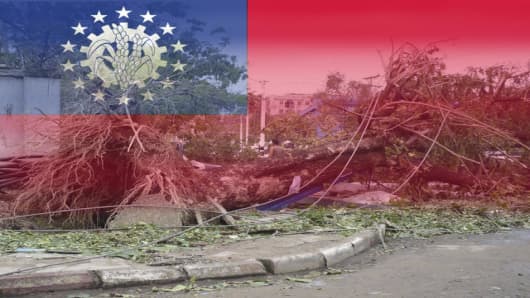Despite the magnitude of the disaster -- the most devastating cyclone to hit Asia since 1991, when 143,000 people died in Bangladesh -- France said the ruling generals in the former Burma were still placing too many conditions on aid.
"The United Nations is asking the Burmese government to open its doors. The Burmese government replies: 'Give us money, we'll distribute it.' We can't accept that," Foreign Minister Bernard Kouchner told parliament.
In New York, the U.N. Office for the Coordination of Humanitarian Affairs said it was prepared to make available a $5 million grant from its central emergency response fund.
But Rashid Khalikov, a senior U.N. aid official, appealed to Myanmar to waive visa requirements for U.N. aid workers trying to get into the country.
"Unfortunately we cannot tell you how many people are in need of assistance," he said. "We just clearly understand that it will probably be in the hundreds of thousands."
Nowhere To Flee
Of the dead, only 671 were in Yangon and its outlying districts, state radio said. The rest were in the vast swamplands of the delta, which was hit by 190 kmh (120 mph) winds and an enormous storm surge.
"More deaths were caused by the tidal wave than the storm itself," Minister for Relief and Resettlement Maung Maung Swe told a news conference in the rubble-strewn city of 5 million, where food and water supplies are running low.
"The wave was up to 12 feet (3.5 metres) high and it swept away and inundated half the houses in low-lying villages," he said, giving the first detailed description of the weekend cyclone. "They did not have anywhere to flee."
As many as 10,000 people died in one coastal town alone.
Information Minister Kyaw Hsan said the military were "doing their best" but analysts said there could be fallout for Myanmar's rulers, who pride themselves on their ability to cope with any challenge.
"The myth they have projected about being well-prepared has been totally blown away," said analyst Aung Naing Oo, who fled to Thailand after a brutally crushed 1988 uprising. "This could have a tremendous political impact in the long term."
U.S. President George W. Bush made a rare personal appeal to the junta to accept U.S. disaster experts who have so far been kept out. "Our message is to the military rulers," Bush said. "Let the United States come and help you, help the people." He said he was prepared to make U.S. naval assets available for search and rescue.
The White House later said the United States was committing $3 million through an aid agency to meet the most urgent needs, up from an initial emergency contribution of $250,000.
Little Food, No Electricity
Reflecting the scale of the crisis, the junta said it would postpone to May 24 a constitutional referendum in the worst-hit areas of Yangon and the delta.
But state TV said the May 10 vote on the charter, part of the army's much-criticized "roadmap to democracy," would proceed as planned in the rest of the Southeast Asian nation, which has been under army rule for the last 46 years.
Its political plans have been condemned by Western governments, especially after the bloody suppression of protests in September.
The information minister said the government had sufficient stocks of rice despite damage to grain stored in the huge delta, known as the "rice bowl of Asia" 50 years ago when Burma was the world's largest exporter.
But in the delta, even villages that managed to withstand the worst of the winds are running out of food and water. "There's not much food," one woman at a pineapple stall in Hlaing Tha Yar, an hour's drive west of Yangon, told Reuters.
In Yangon, people lined up for bottled water and there was still no electricity four days after the cyclone hit.
Prices of food, fuel and construction materials have skyrocketed and most shops have sold out of candles and batteries. An egg costs three times what it did on Friday.
'Just Terrible'
The disaster drew a rare acceptance of a trickle of outside help from the diplomatically isolated generals, who spurned such approaches after the 2004 Indian Ocean tsunami.
Thailand flew in nine tons of food and medicine, the first foreign aid shipment, but a Reuters cameraman on the plane said supplies were unloaded by hand as no forklift trucks were available -- a sign the army may lack vital equipment.
Two Indian transport planes are due to fly in on Wednesday and more are on standby, officials in New Delhi said.
The United Nations, which has 1,650 international and local staff in Myanmar, said the children's agency UNICEF had delivered drugs, first aid kits and oral rehydration tablets in Labutta township, a hard-hit area in the delta.
State media have made much of the army's response, showing soldiers manhandling tree trunks or generals climbing into helicopters or greeting homeless victims in Buddhist temples.
Aid agency World Vision in Australia said it had been granted special visas to send in personnel to back up 600 staff in the impoverished country.
"This is massive," World Vision Australia head Tim Costello said. "It is not necessarily quite tsunami level but in terms of impact of millions displaced, thousands dead, it is just terrible."


